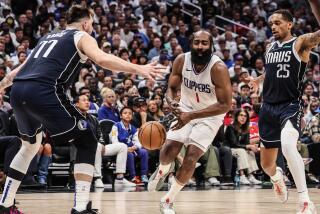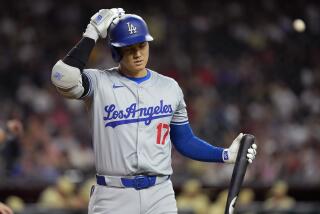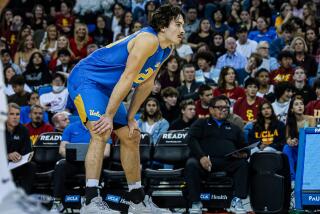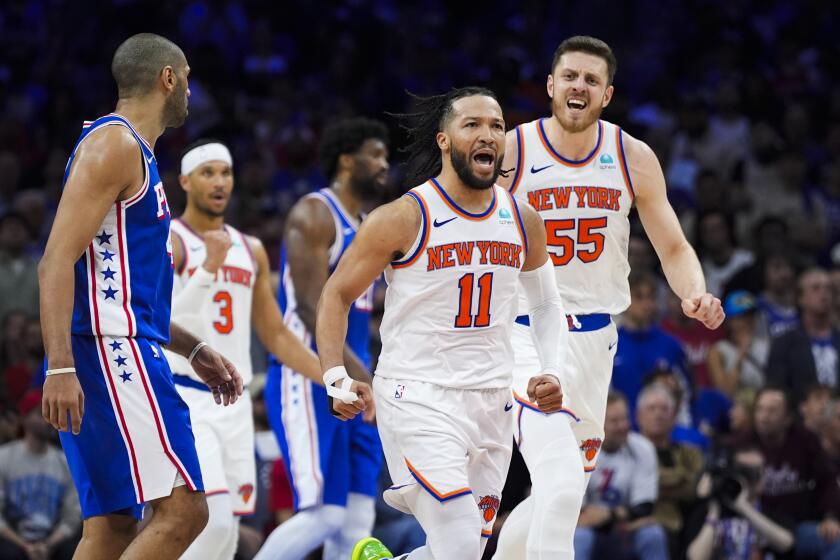Serena Is the Big Sister Now
There almost is always a defining moment in a rivalry. Maybe it’s something as subtle as hearing the words Serena Williams and Venus Williams--in that order.
The tennis world knew exactly when Monica Seles moved ahead of Steffi Graf. Or when Martina Navratilova left Chris Evert behind. Those shifts are identifiable, and often unfold at Grand Slams.
Another such moment arrived Saturday night at the U.S. Open when Serena Williams nearly went crashing into a posse of courtside photographers in the second set. She might have lost the point, but it was clear she would try to chase down any shot, anywhere.
And, after 72 minutes, top-seeded Serena left no doubt that she is the best female player in the world, defeating her older sister and two-time defending champion Venus Williams, 6-4, 6-3. It is her third consecutive Grand Slam title, matching Graf’s run in 1996.
On paper, nearly everything looks equal between the sisters. Venus has four Slams. Serena has four. Venus has defeated Serena five times. Serena has won five times against Venus.
Equality is a mirage.
Serena has won their last four matches, all in straight sets, including the French Open and Wimbledon finals this year. The closest Venus has been able to get to Serena in a set was the opening one at Wimbledon, which went to a tiebreaker.
This is no longer a gap between the sisters and the rest of the players, but a great divide between Serena and the mortals of the tour, who now include Venus. The form we’ve come to expect from Venus was nowhere in evidence Saturday, when she had three aces, 10 double faults and a noticeably slower first serve.
Venus never found her stride and Serena did not let her establish a rhythm. In the opening game, Venus was forced to fend off four break points, and went on to lose her serve in the seventh game. Serena broke her at 30, hitting a forehand cross-court return winner.
That in itself was not shocking. What was surprising was that the speed of Venus’ second serve was a moderate 78 mph.
Venus barely escaped against Chanda Rubin in the fourth round and the near miss seemed to stick with her. She looked tired and played tired.
“I think Serena was the best player in the whole tournament this year,” said Venus, who spoke wearily of needing a break from the game. “I have to give it to her for that.”
The contest now is not between Serena and Venus. The more interesting chase is Serena’s pursuit of history. Had she not suffered a serious ankle injury in Sydney, putting her out of the Australian Open in January, Serena might be the first Grand Slam winner since Graf in 1988.
“You know what, I never thought about it till you just said it,” Serena said. “So I try not to bring negative thoughts into my mind.
“Oh, I could have, huh? Maybe it was meant to happen this way, because now when I can go to Australia [next year], I can gain tons of points and just start over.
“I’m still young.”
She also wasn’t buying into the notion that a non-calendar-year Grand Slam is a legitimate Grand Slam.
“It’s a Serena Slam. I have to start over when I get in Australia,” said Williams, who has never gone past the quarterfinals in Melbourne.
By then she will be 21. Her birthday is Sept. 26. Graf and Seles were ahead of her in terms of Grand Slams won at the same age, but then again, Serena has had Venus as a major obstacle.
“Those are people that when I was younger I grew up admiring and hoping that maybe I would even be able to be on that level,” Serena said. “Just hoping. So for me, I’m 20, I’m kind of young.”
On the Williams vs. Williams scale, this Grand Slam final ranked somewhere in the middle, with Wimbledon this year representing the high end, the French Open in June the low.
Venus was asked if she felt there was any sort of noticeable backlash. The crowd support was with Amelie Mauresmo of France when they met in the semifinals Friday.
Four of the last five Grand Slam finals have been all-Williams finals. Of course, few concerns were voiced during the Evert-Navratilova era or when Graf played Navratilova in three Slam finals in 1987.
“All I know is that I don’t know,” Venus said. “That’s fine. I don’t know anything as far as what the fans feel. I’ve never met anyone who’s walked up to me [and said], ‘I don’t want to see a Williams-Williams final. Lose.’ I haven’t met those people yet.”
More to Read
Get our high school sports newsletter
Prep Rally is devoted to the SoCal high school sports experience, bringing you scores, stories and a behind-the-scenes look at what makes prep sports so popular.
You may occasionally receive promotional content from the Los Angeles Times.







